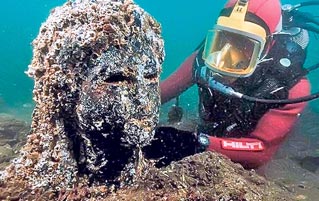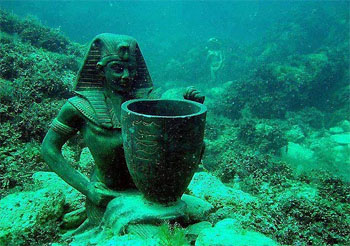4 Nightmare Apocalypses Humanity Forgot Were Possible

Do you, like us, lie awake at night, clenching your sphincter against a tidal wave of terror while you contemplate the ease with which the universe could just up and destroy all of human civilization at any second? If so, you're in luck! This article will validate all of your seemingly irrational fears! Or wait, no: You're not in luck. This article will validate all of your seemingly irrational fears.
The Island Settlement Of Akrotiri Was Way Ahead Of Its Time (Until Said Island Exploded)
Around 2,000 BC, the city of Akrotiri -- built upon an island now known as Santorini, in the southern Aegean Sea -- was a bustling sea port. Akrotiri was essentially awash with iPhones in an era when the landline was king: They had multi-story dwellings, their interiors covered in elaborate frescoes, paved roads, advanced metalworking, indoor running water, and flush-toilets. We'd suspect that the natives of Akrotiri were time travelers, if not for the fact that they built their highly advanced settlement right beneath the most destructive volcano the world has seen in the last 10,000 years.

"Yeah, but multi-story beach front property, eh?"
In 17th-century BC, a magnitude 7 earthquake reduced the town to rubble, then smacked the ruins with a few 30-foot tidal waves for good measure. There's archaeological evidence that the survivors had begun cleaning up and rebuilding... when the island's volcano, Thera, erupted.

"Okay, third strike, assholes." -- God
The eruption was four to five times more powerful than Krakatoa, releasing hundreds of atomic bombs' worth of energy in less than one second. When the dust finally settled, it perfectly preserved the ruins of the city for modern-day archaeologists to gawk at.

"--And here we have a citizen who was clearly caught mid-jack."
If widespread theories are correct, then Thera may have been Plato's inspiration for the Atlantis myth -- a destroyed island, a lost, highly advanced civilization -- but, if anything, the myth downplays the reality. It didn't just sink beneath the sea, it took a killer three-hit combo from nature, all but simultaneously crumbling, drowning, and exploding. If Mother Nature ever hated anything more than Thera, she didn't let us know about it.
A "Mega El Nino" Drowned The Moche Civilization For 30 Years, Followed By 30 Years Of Drought
For the better part of the first millennium AD, the Moche civilization ruled over northern Peru. They were known for their advanced irrigation techniques, skill with textiles, and for producing a preponderance of pottery depicting butt stuff. Truly, they were an advanced race.

Don't ask where the spout goes.
So why are they not as familiar to us, as say, the Aztecs, or the Incas? Because to accurately convey what happened to them, history teachers would have to pantomime some kind of nightmare version of The Lorax. The Moche fell victim to climate change. Specifically, they fell victim to a Mega El Nino, which is just like the El Nino you know, except mega.

El Adulto, if you will.
By studying ice cores taken from ancient glaciers in the Andes Mountains, climatologist Dr. Lonnie Thompson discovered that the Moche homeland had been subjected to a weather pattern worse than anything we've seen in the last 500 years. For 30 straight years, it rained on the Moche. A ruinous, incessant rain the likes of which nobody had ever seen before, destroying their crops, rocking their entire belief system to the core (the Moche believed that human sacrifice was rewarded with crop-friendly weather; they kept on killin', and it kept on rainin'!), and presumably rendering their potted butt-stuff sad and flaccid.

"Who knew butt stuff could end up so shitty?"
As if that weren't bad enough, the 30 years of biblical rain was then immediately followed by 30 years of no rain at all. Archaeologist Dr. Tom Dillehay posits that this "climatic double-whammy" demolished not only the Moche's way of life, but the common folks' faith in their leaders, who'd spent hundreds of years guaranteeing them good weather at the low, low cost of carving out the occasional still-beating heart.

"We sacrificed SO MANY virgins ... Well, technically virgins..."
The Little Ice Age Wreaked Havoc On The Northern Hemisphere
In the early 1300s, the normally bitterly cold climate of Greenland shifted to inconceivably goddamned cold, thereby decimating the livestock of the Viking colonies that had thrived there for centuries. As the Vikings desperately attempted to shift to a seafood diet, the cod, in turn, shifted to more habitable waters. Thus the Vikings of Greenland -- those proud, pointy-helmeted conquerors of faraway lands -- were undone by a case of the chillies.

Above: What Viking headgear should have looked like.
Over in northern Europe, the spring of 1315 kicked off three years of constant rain, stripping away the topsoil and transforming the crops to pure rot. As the lower classes were reduced to eating cats and dogs and (allegedly) even one another to survive, Mother Nature piled on the cruelest winters this side of Westeros.
The period between 1300 and the mid-1850s was "the coldest interval over the Northern Hemisphere for one thousand or so years," and was marked by plagues, famines, and extreme climate swings. The oceans grew colder. Sea ice greatly expanded from the Poles. Glaciers in the Swiss Alps advanced, crushing farms and villages. Then Mount Tambora erupted in 1815, spewing clouds of ash into the atmosphere, which transformed 1816 into "the year without a summer."

Games Of Thrones spoilers. Probably.
That year in Vermont, it snowed in June. Meanwhile, in London, the Thames froze so deeply they set up Frost Fairs atop the ice, "complete with merchants' booths, sleds, even ice boats."

Because if the ever-looming threat of frozen death isn't a reason to party, what is?
The Mediterranean Sea Swallowed The City Of Thonis-Heracleion
About 20 miles northeast of Alexandria lie the remains of the ancient Egyptian city of Thonis-Heracleion, the city so nice they named it twice. Here's a picture:

...From about 2,700 years ago. It's a bit more moist today.
Long considered to be the stuff of legend, Thonis-Heracleion dates back to 12th century BC. In its heyday, the city was the bustling epicenter of trade between Ancient Egypt (thus the Thonis) and the western world (aka Ancient Greece, thus the Heracleion). The problem? Thonis-Heracleion was built upon "a series of interlinked islands, sand, and mudbanks," all connected by ferries, bridges, and pontoons. Picture Venice, but with fewer mustaches. Or more. We don't know much about 12th-century BC hairstyles.
Anyway, spoiler alert:

Bad news, Akrotiri. We found a better Atlantis.
Around 1,200 years ago, God went through a Roland Emmerich phase and sent a few tremors the city's way. A towering statue of the god Hapi, which had stood watch over the port of entry for untold eons, took a nose-dive into the depths of the Mediterranean. The ground beneath its buildings succumbed to liquefaction, and the rest of the city soon followed suit. They later described the disaster as something like yanking the tablecloth from beneath a house of cards. One minute Thonis-Heracleion was teeming with merchants hawking whatever the ancient equivalent of a hotdog is, the next minute it was teeming with fish.

Hawkers sold flounder-on-a-stick for a minute, then drowned.
The city passed into legend clear up until 1933, when Royal Air Force pilots reported the outline of man-made structures 150 feet below the bay. And it wasn't until the early 2000s that archaeologists began retrieving the city's treasures from the depths -- beginning with the aforementioned statue of Hapi, god of water and fertility.

Which was appropriate, because they all got totally fucked by that water.
Luke is the writer of two TV shows: Docklands, a vivid drama set in Victorian London, and Phantom Limb, a comedy with spirit(s). He is in search of a producer for either project.
Behind every awful movie is the idea for a good one. Old man Indiana Jones discovers aliens: Good in theory, bad in practice. Batman fights Superman: So simple, but so bad. Are there good versions of these movies hidden within the stinking turds that saw the light of day? Jack O'Brien hosts Soren Bowie, Daniel O'Brien, and Katie Willert of After Hours on our next live podcast to find an answer, as they discuss their ideal versions of flops, reboots, and remakes. Tickets are $7 and can be purchased here!
For more ways the outdoors will destroy us all, check out The 5 Most Spectacular Landscapes On Earth (That Murder You) and 5 Bizarre Ways the Weather Can Kill You Without Warning.
Subscribe to our YouTube channel, and check out 3 Foreign Countries That Just Don't Give a F#@%, and other videos you won't see on the site!
Follow us on Facebook, and we'll follow you eveywhere.